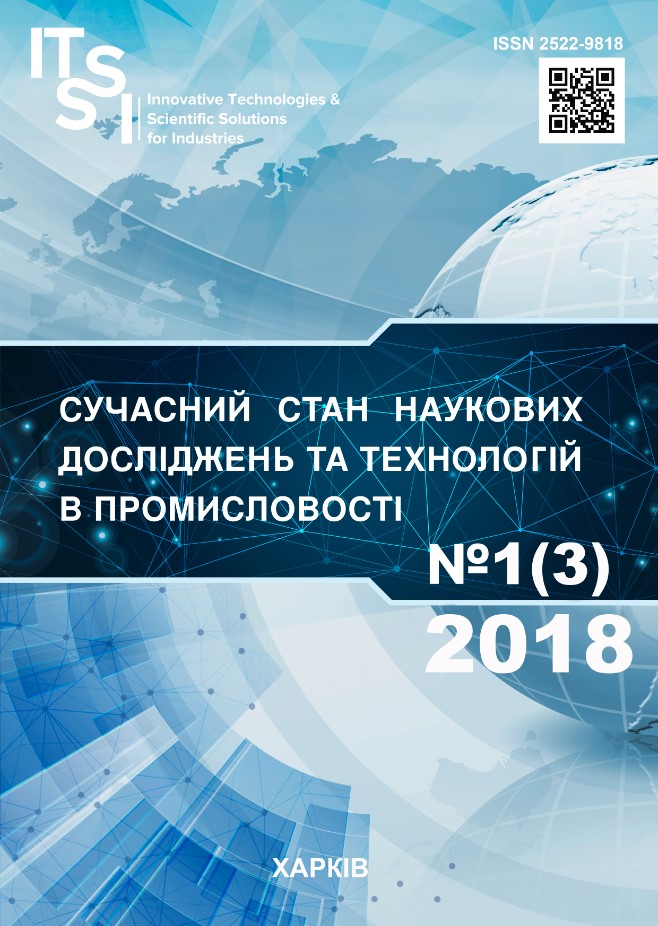INTELLIGENT MEANS IN THE SYSTEM OF MANAGING A MANUFACTURING AGENT
DOI:
https://doi.org/10.30837/2522-9818.2018.3.033Keywords:
logical model, intellectual agent, mobile robot, the theory of predicatesAbstract
The subject of the study is intellectual means in the system of managing an intelligent manufacturing agent; the goal is to ensure the quality of managing a flexible integrated robotic system by developing the intellectual decision support system. The following problems are solved in the work: current tendencies of developing and implementing the intelligent systems for production management are considered; the demands for developing simulation models of decision support systems for solving flexible integrated production systems are formulated; the logical model of a decision support system for an intelligent manufacturing agent is developed, this model describes the decision-making process in the form of the functioning strategy formation on the basis of the knowledge of the current state of the integrated system, the system of knowledge describing probable actions of the robotic equipment, the objectives of the production system, and adapts the strategy if the working space of the integrated system or its individual goals change; the system of knowledge of a flexible integrated system is presented as a set of standard description of probable actions for robotic equipment; the distributed workspace of integrated systems is considered and described; separate objects are identified using the means of computer vision. The research is based on the following theoretical and practical foundations: the theory of sets is used to represent general simulation models of the decision support system; the theory of predicates is used to create a logical model of decision-making; knowledge-oriented methods and the tools of Prolog programming language use used to represent the knowledge system of a flexible integrated system, the MatLab system is used to analyse the workspace of a flexible integrated system. The following results are obtained – mathematical and informational software of the system for managing an intelligent production robotic agent is developed. The possibilities of the proposed model application in the system of managing an intelligent robot are shown and the ways for improving such systems are suggested.References
Veselovskaya, N. R., Strutinsky, V. B., Zelinskaya, A. V. (2009), "Prospects for the development of flexible computer-integrated production systems", Scientific notes. Electronic Journal, Vol. 25, T. 1, available at : http://archive.nbuv.gov.ua/portal/natural/nn/2002_2009/statti/vup25/25-1/11.pdf
Kerak, P., Holubek, R., Kostal, P. (2012), Novel trends in the intelligent manufacturing systems, Proc. From 8th International Baltic Conference "Industrial Engineering", Apr. 19–21, 2012, Tallinn, available at : http://innomet.ttu.ee/daaam/proceedings/pdf/Kerak.pdf
Ladanuk, A., Ladaniuk, A., Prokopenko, T., Reshetiuk, V. (2014), "The model of strategic management of organizational and technical systems, taking into account risk-based cognitive approach", Annals of Warsaw University of Life Science - SGGW Agriculture, No. 63, P. 97–104.
Eiter, T., Wolfgang, F., Leone, N., Pfeifer, G., Polleres, A. (2004), "A Logic Programming Approach to Knowledge-State Planning: Semantics and Complexity", ACM Transactions on Computational Logic, Vol. 5, No. 2, P. 206–263.
Bodiansky, E. V., Kucherenko, E. I., Mikhalev, A. I., Filatov, V. A., Gasik, M. M., Kucin, V. S. (2013), Intellectual control of technological processes (ferroalloy production) : Monograph Under Ed. AI Mikhaleva, Dnipropetrovsk : VVK NMetAU, 213 p.
Nevlyudov, I. Sh., Tsymbal, A. M., Milyutina, S. S. (2010), Intellectual design of technological processes of a robotic assembly, Kharkiv : НТМТ, 206 p.
Shevchenko, A. I., Salnikov, I. S., Salnikov, R. I. (2006), "Anthropomorphic robots: evolution, problems and perspectives, Artificial Intelligence, No. 3, P. 52–60.
Nau, D., Au, T., Il-ghami, O., Kuter, U., Murdock, J.W., Wu, D., Yaman, F. (2003), "SHOP2: An HTN Planning System", Journal of Artificial Intelligence Research, No. 20. P. 379–404.
Tsymbal, O. M., Bronnikov, A. I. (2011), "Adaptability in the decision-making of robots", East-European magazine of advanced technologies, No. 4/4 (52), P. 40–43.
Setlak, G. (2002), "Intelligent system of support for decision-making in a fuzzy environment", Artificial Intelligence, No. 3. P. 428–438.
Yushchenko, A. S. (2002), "Remote control of robots using fuzzy representations", Artificial Intelligence, No. 4, P. 388–396.
Thrun, S., Burgard, W., Fox, D. (2005), Probabilistic Robotics, The MIT Press, 667 p.
Starodubtsev, N. G., Fomovsky, F. V., Neviudova, V. V., Malaja, I. А., Demska, N. P. (2017), "Mathematical modelling of selecting informative features for analyzing the life cycle processes of radio-electronic means", Innovative Technologies and Scientific Solutions for Industries, No. 1 (1), P. 82–89. DOI: 10.30837/2522-9818.2017.1.082
Tsymbal, A. M. (2014), "Methodological Aspects of Planning Strategies for the Intellectual Robot Control System", Vestnik BSTU them. VG Shukhov, Belgorod, No. 2, P. 139–142.
Nyevlyudov, I., Tsymbal, O., Chochowski, A., Lysenko, V., Reshetiuk, V., Komarchuk, D., Kuliak, B. (2016), Methods and Models of Intellectual Decision-Making Support for Automatized Control of Flexible Integrated Manufacturing, Kyiv : Agrar Media Group, 356 p.
Downloads
Published
How to Cite
Issue
Section
License
Copyright (c) 2018 Igor Nevliudov, Oleksandr Tsymbal, Artem Bronnikov

This work is licensed under a Creative Commons Attribution-NonCommercial-ShareAlike 4.0 International License.
Our journal abides by the Creative Commons copyright rights and permissions for open access journals.
Authors who publish with this journal agree to the following terms:
Authors hold the copyright without restrictions and grant the journal right of first publication with the work simultaneously licensed under a Creative Commons Attribution-NonCommercial-ShareAlike 4.0 International License (CC BY-NC-SA 4.0) that allows others to share the work with an acknowledgment of the work's authorship and initial publication in this journal.
Authors are able to enter into separate, additional contractual arrangements for the non-commercial and non-exclusive distribution of the journal's published version of the work (e.g., post it to an institutional repository or publish it in a book), with an acknowledgment of its initial publication in this journal.
Authors are permitted and encouraged to post their published work online (e.g., in institutional repositories or on their website) as it can lead to productive exchanges, as well as earlier and greater citation of published work.














